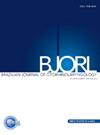Evaluation of clinical outcomes after partial horizontal laryngectomy
IF 1.7
4区 医学
Q2 OTORHINOLARYNGOLOGY
引用次数: 0
Abstract
Objective
Evaluate the oncological and functional outcomes of patients submitted to HPL for the treatment of LSCC.
Methods
A retrospective descriptive study of patients submitted to HPL, performed at a cancer referral center, between January 2011 and December 2017.
Results
We evaluated 37 patients. The major pathological staging of the primary tumor was pT3 (35.1%), followed by pT2 (32.4%). Five patients required adjuvant radiotherapy; 62.2% of the patients were decannulated by the end of the treatment; 10.8% weren’t decannulated; 8.1% underwent a retracheostomy, and 18.9% had total laryngectomy. From the patients submitted to total laryngectomy, 3 cases were due to rehabilitation failure, 2 due to recurrence and 2 cases due to postoperative suture dehiscence. About 89% of the patients resumed oral feeding following the procedure; 86.4% didn’t present disease recurrence; 31 patients survived without disease; 3 died from disease-related causes, and 3 from unrelated causes.
Conclusion
HPL is an alternative procedure to total laryngectomy, presenting adequate rates of local control and overall survival while also maintaining laryngeal function. The main challenge to HPL remains achieving an ideal selection of patients.
Level of evidence
Level IV.
部分水平喉切除术后临床效果的评价
目的评价HPL治疗LSCC患者的肿瘤和功能预后。方法对2011年1月至2017年12月在癌症转诊中心接受HPL治疗的患者进行回顾性描述性研究。结果对37例患者进行评估。原发肿瘤病理分期以pT3分期为主(35.1%),其次为pT2分期(32.4%)。5例患者需要辅助放疗;治疗结束时,62.2%的患者脱胎换骨;10.8%未脱管;8.1%行气管再造口术,18.9%行全喉切除术。在接受全喉切除术的患者中,康复失败3例,复发2例,术后缝合开裂2例。约89%的患者术后恢复口服喂养;86.4%无疾病复发;31例无病存活;3人死于疾病相关原因,3人死于无关原因。结论hpl是一种可替代全喉切除术的手术方法,在维持喉功能的同时可获得足够的局部控制率和总生存率。HPL的主要挑战仍然是实现理想的患者选择。证据等级:四级。
本文章由计算机程序翻译,如有差异,请以英文原文为准。
求助全文
约1分钟内获得全文
求助全文
来源期刊

Brazilian Journal of Otorhinolaryngology
OTORHINOLARYNGOLOGY-
CiteScore
3.00
自引率
0.00%
发文量
205
审稿时长
4-8 weeks
期刊介绍:
Brazilian Journal of Otorhinolaryngology publishes original contributions in otolaryngology and the associated areas (cranio-maxillo-facial surgery and phoniatrics). The aim of this journal is the national and international divulgation of the scientific production interesting to the otolaryngology, as well as the discussion, in editorials, of subjects of scientific, academic and professional relevance.
The Brazilian Journal of Otorhinolaryngology is born from the Revista Brasileira de Otorrinolaringologia, of which it is the English version, created and indexed by MEDLINE in 2005. It is the official scientific publication of the Brazilian Association of Otolaryngology and Cervicofacial Surgery. Its abbreviated title is Braz J Otorhinolaryngol., which should be used in bibliographies, footnotes and bibliographical references and strips.
 求助内容:
求助内容: 应助结果提醒方式:
应助结果提醒方式:


